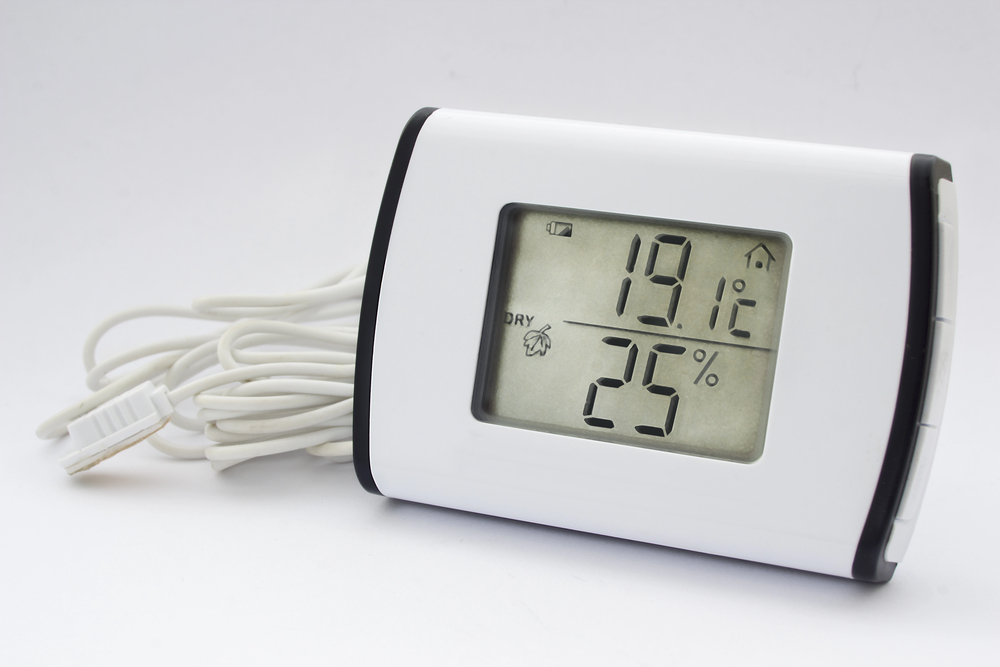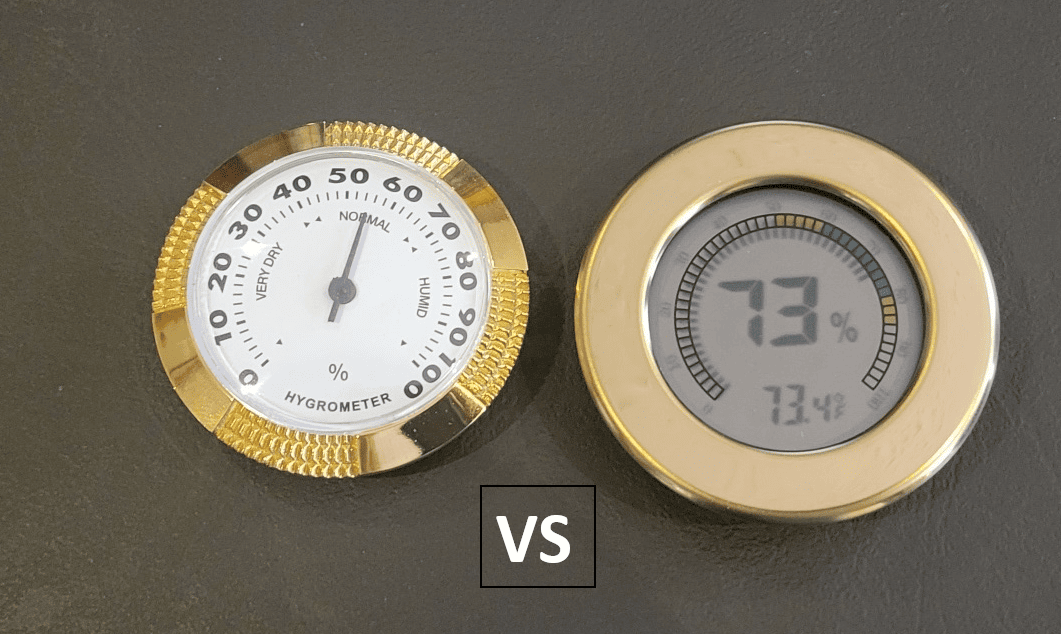Are you curious about which hygrometer is the right fit for your needs—digital or analog? Choosing between these two can feel confusing, especially when you want accurate humidity readings without hassle.
Your comfort, health, and even the safety of your belongings depend on getting this right. You’ll discover the real differences, benefits, and drawbacks of digital and analog hygrometers. By the end, you’ll feel confident about which one suits your lifestyle and environment perfectly.
Keep reading to make an informed choice that truly works for you.

Credit: www.cheaphumidors.com
Basics Of Hygrometers
Understanding the basics of hygrometers helps you choose the right one. These tools measure humidity, which affects comfort, health, and many processes. Knowing how they work and their types makes it easier to pick between digital and analog models.
What Is A Hygrometer
A hygrometer measures the amount of moisture in the air. It shows humidity as a percentage. High humidity means more water vapor; low means dry air. People use hygrometers in homes, greenhouses, and weather stations.
Types Of Hygrometers
There are several types of hygrometers. Analog ones use physical parts like hair or paper that change with humidity. Digital hygrometers use sensors and display numbers on a screen. Each type has its own benefits and limits.
How Analog Hygrometers Work
Understanding how analog hygrometers work helps you appreciate their simple, reliable design. These devices measure humidity using physical changes in materials that react to moisture. No batteries or digital screens needed. Just pure mechanics at work.
Mechanical Principles
Analog hygrometers use materials that change shape with humidity. Hair or synthetic fibers stretch or shrink as moisture levels change. This movement moves a needle on a dial. The needle shows the current humidity percentage. The process is purely mechanical, driven by natural reactions to moisture.
Common Designs
Many analog hygrometers use human or horse hair strands. Hair length changes with humidity, pulling a lever. Other designs use a metal coil that expands or contracts. These changes turn the pointer on the display. The dial is easy to read, showing humidity at a glance.
How Digital Hygrometers Work
Digital hygrometers measure the amount of moisture in the air using electronic parts. These devices give quick and accurate readings. They are easy to read and often come with extra features. Understanding how they work helps in choosing the right one for your needs.
Electronic Sensors
Digital hygrometers use sensors to detect humidity. Most common are capacitive sensors. These sensors change their electrical charge based on the moisture level. The device reads this change and converts it into a humidity percentage. Some hygrometers use resistive sensors, which change resistance with humidity. Both types are reliable and fast.
Display And Features
The readings show on a digital screen. Usually, this screen is an LCD for clear visibility. Some models show temperature along with humidity. Many have memory functions to track changes over time. Others include alarms to warn about high or low humidity. The compact design makes these devices portable and user-friendly.
Accuracy Factors
Accuracy is a key factor when choosing between digital and analog hygrometers. It determines how well these devices measure humidity levels. Several factors impact this accuracy. Understanding these can help you pick the right hygrometer for your needs.
Calibration Methods
Calibration is crucial for accurate readings. Digital hygrometers often come pre-calibrated from the factory. You can also recalibrate them using specific tools or salt tests. Analog hygrometers require manual calibration. This often involves adjusting a screw or dial based on a known humidity level. Regular calibration keeps both types reliable over time.
Environmental Influences
Temperature changes can affect hygrometer accuracy. Analog devices are more sensitive to temperature swings. They may show incorrect readings in very hot or cold conditions. Digital hygrometers handle temperature changes better. Dust and dirt can also impact analog sensors. Digital sensors usually have protective covers to reduce this effect. Placing your hygrometer away from direct sunlight improves accuracy too.
Pros And Cons Of Analog Hygrometers
Analog hygrometers have been popular for many years. They use mechanical parts to measure humidity. Understanding their pros and cons helps decide if they fit your needs.
Advantages
Analog hygrometers do not need batteries. They often have a classic, simple design. These devices are easy to read at a glance. They provide quick humidity levels without delays. Many models are durable and can last long. Some users find them more reliable in steady environments.
Limitations
Analog hygrometers may lose accuracy over time. They need regular calibration to stay precise. Reading them can be tricky in low light. Small changes in humidity might not show clearly. They lack extra features like digital displays or memory. Mechanical parts can wear out or get stuck.
Pros And Cons Of Digital Hygrometers
Digital hygrometers offer modern features that attract many users. They provide quick and clear readings of humidity levels. Understanding the benefits and drawbacks helps in choosing the right device.
Advantages
Digital hygrometers show humidity accurately and fast. They often include extra features like temperature display. Many models allow easy calibration for better precision. The digital screen is easy to read in low light. Some devices store data for tracking changes over time. Portable designs make them simple to carry and use anywhere.
Limitations
Digital hygrometers need batteries or power to work. They can be less durable compared to analog models. Some cheap versions give false readings after a short time. Electronic parts may fail in very humid or hot places. The price tends to be higher than analog devices. Small screens can be hard to read from far away.
Maintenance And Durability
Maintenance and durability are key factors when choosing a hygrometer. Both digital and analog models need care to last long. Understanding their upkeep helps you keep readings accurate. It also saves money by avoiding early replacements.
Analog hygrometers are mechanical. They can last many years with proper care. Digital models rely on electronic parts. These parts may wear out faster without good maintenance. Each type has unique needs for durability.
Care Tips For Analog Models
Keep analog hygrometers clean. Dust and dirt can affect their moving parts. Use a soft cloth to wipe the surface gently. Avoid using water or cleaning sprays directly.
Check the calibration often. Analog devices may lose accuracy over time. Adjust the dial if needed to keep readings correct. Store the device in a dry place to prevent rust or corrosion.
Protect it from shocks and drops. Mechanical parts inside are delicate. Handle the hygrometer carefully to avoid damage.
Care Tips For Digital Models
Replace batteries regularly. Weak batteries cause wrong readings or device failure. Follow the manufacturer’s instructions for battery type and change intervals.
Keep digital screens clean but dry. Use a soft cloth to avoid scratching. Avoid exposing the device to extreme heat or moisture.
Store digital hygrometers in a safe, dry place. Avoid places with strong magnetic fields. These can interfere with the electronics.

Credit: calright.com
Best Use Cases
Choosing the right hygrometer depends on where and how you plan to use it. Both digital and analog devices measure humidity, but each has strengths suited to different settings. Understanding these use cases helps in picking the best tool for your needs.
Ideal Situations For Analog
Analog hygrometers work well in places without electricity. They are great for simple home use or small greenhouses. These devices do not need batteries or power to run. They show humidity with a needle on a dial, making it easy to read at a glance. Many people prefer analog for their classic look and quiet operation. They also handle rough conditions better, such as in outdoor sheds or barns. Analog models are suitable for those who want a basic, reliable tool without tech features.
Ideal Situations For Digital
Digital hygrometers suit high-precision needs like labs or medical settings. They give exact humidity readings with numbers on a screen. These devices often include extra features like temperature display and memory for past readings. Digital models are useful in places where small changes in humidity matter. They work best indoors in controlled environments, such as offices or museums. Many digital hygrometers have alarms to warn about unsafe humidity levels. People who want quick, clear data prefer digital devices for their accuracy and convenience.
Cost Comparison
Cost plays a big role in choosing between digital and analog hygrometers. Understanding the price differences helps pick the best fit for your needs and budget.
Both types serve the same purpose but have different cost structures. Examining initial and long-term expenses reveals the true value of each option.
Initial Investment
Analog hygrometers usually cost less upfront. They have simple parts and no batteries. This makes them cheaper to buy.
Digital hygrometers cost more at first. They use sensors and display screens. This adds to the price but offers extra features.
Long-term Expenses
Analog models rarely need extra costs. They do not require power or replacements often. This keeps expenses low over time.
Digital devices may need batteries or calibration. These add to the cost after purchase. Checking batteries regularly is important for accuracy.
Repairs or replacements for digital parts can also increase expenses. Analog devices usually last longer without issues.

Credit: cigarstar.ca
Making The Right Choice
Choosing between a digital and analog hygrometer can feel tricky. Both types show humidity levels but work differently. Picking the right one depends on your needs and preferences.
Factors To Consider
Think about accuracy. Digital models often give precise readings. Analog ones may be less exact but still reliable.
Check ease of use. Digital hygrometers usually have clear displays. Analog versions require reading a dial.
Consider power needs. Digital devices need batteries or power sources. Analog hygrometers work without electricity.
Look at durability. Analog models tend to be sturdy. Digital ones might be delicate or break easily.
Price matters too. Analog hygrometers often cost less. Digital versions can be pricier but offer more features.
Recommendations
For home use, a digital hygrometer is good. It shows numbers clearly and updates fast.
If you want simple and low cost, go for analog. It works well and lasts long.
Use digital hygrometers for places needing exact humidity control. Labs or greenhouses benefit from their precision.
Choose analog for basic monitoring in garages or basements. It gives a good general idea.
Frequently Asked Questions
What Is The Main Difference Between Digital And Analog Hygrometers?
Digital hygrometers provide precise humidity readings with digital displays. Analog hygrometers use mechanical parts and dials. Digital models are generally easier to read and more accurate, while analog types offer simplicity and no battery requirement.
Which Hygrometer Type Is More Accurate, Digital Or Analog?
Digital hygrometers are typically more accurate due to electronic sensors. Analog hygrometers may have slight reading variations over time. For precise humidity control, digital devices are preferred, especially in sensitive environments.
How Do Digital Hygrometers Work Compared To Analog?
Digital hygrometers use electronic sensors to measure humidity and display results digitally. Analog hygrometers rely on materials that expand or contract with moisture, moving a needle on a dial. Digital devices offer quicker, more consistent readings.
Are Analog Hygrometers Still Reliable For Home Use?
Yes, analog hygrometers remain reliable for general home humidity monitoring. They require no power and are easy to maintain. However, they may need regular calibration to ensure accuracy over time.
Conclusion
Choosing between digital and analog hygrometers depends on your needs and budget. Digital hygrometers offer quick and clear readings. Analog ones are simple and do not need batteries. Both types help track humidity well. Think about ease of use and accuracy.
Your environment and how often you check matter. Either choice can keep your space comfortable. Pick what feels right for you.

